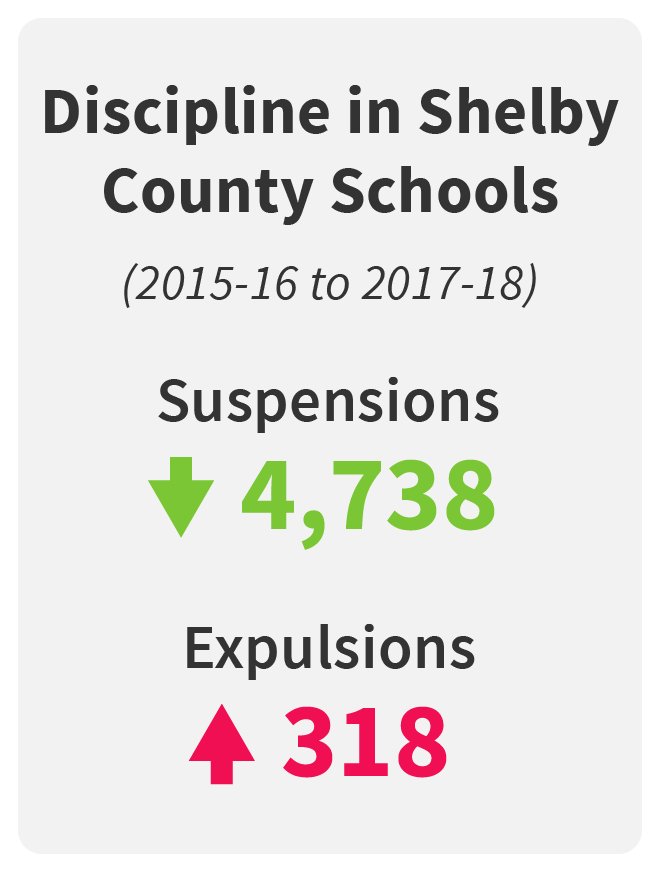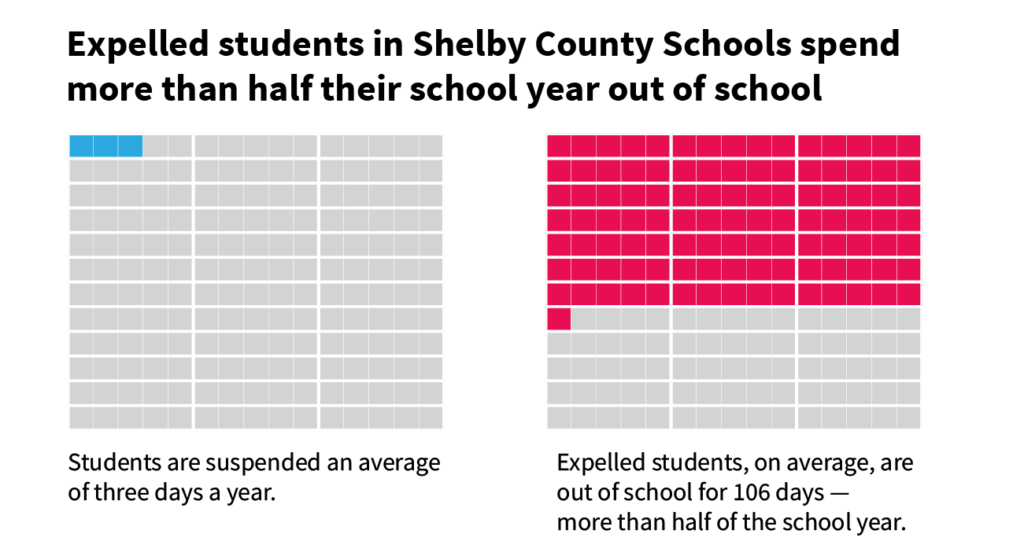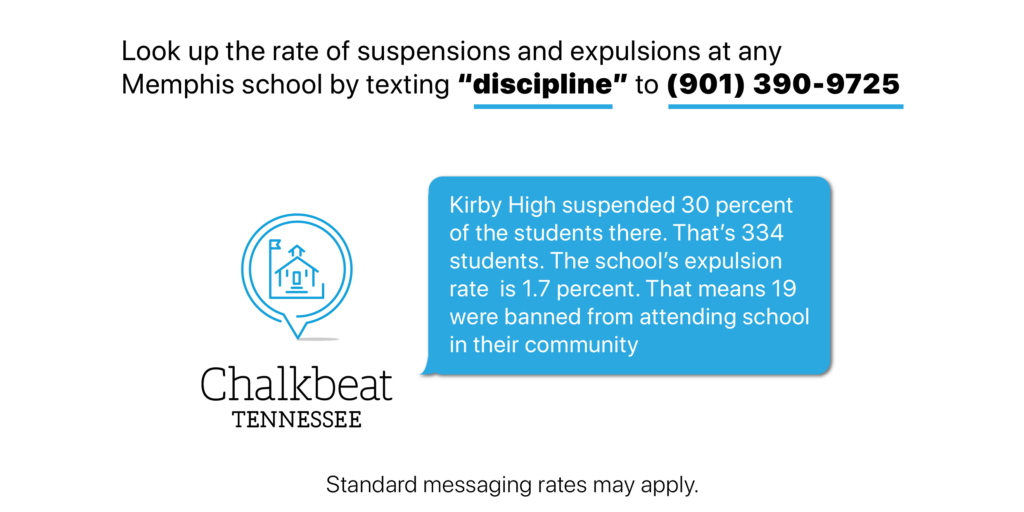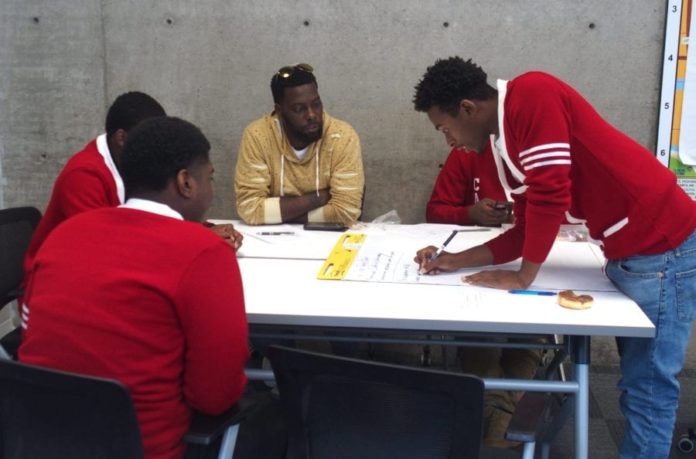Hidden behind what Memphis education officials have said is good news when it comes to student discipline is a disturbing trend: As short-term suspensions have decreased, expulsions have increased.

Last year, Shelby County Schools handed down nearly 2,500 expulsions, according to district data. That’s about 300 more than in the 2015-16 school year — when the district already had one of the highest expulsion rates in the nation, according to federal data.
In one extreme example, a single high school issued one expulsion for every six students.
On average, expelled students were barred from school for 106 days, or more than half of the school year.
And while Tennessee law and district policies mandate expulsions for some offenses, 83 percent of the expulsions came at school leaders’ discretion. A third were for violations of relatively minor rules.
The expulsion data reveals mixed results for the district’s push to reduce discipline methods that keep students out of school. Shelby County Schools handed out 4,700 fewer suspensions last year than in the 2015-16 school year. Yet the rise in expulsions means that the total number of school days that students missed for discipline reasons actually increased.
Students spent about 14,200 more days in class because of the reduction in suspensions, based on the average three-day punishment. But the increase in expulsions resulted in close to 33,700 more missed school days.
The district’s black boys bore the brunt of the trend. They make up 38 percent of the district’s more than 100,000 students, but accounted for 67 percent of expulsions last year.
The data is raising questions among supporters of Shelby County’s discipline push, which launched as the federal education department pressed districts to limit suspensions and expulsions and reduce racial disparities among students who are punished.
“What we don’t want is for practices that we’re trying to replace to be replaced with practices that don’t support students,” said Cardell Orrin, executive director of Stand for Children, an advocacy group that has supported the district’s discipline efforts. “If we hide at all what are the real struggles, then we don’t identify the resources that are needed.”
(Tennessee defines suspensions as exclusions from school lasting less than 10 days; suspensions longer than 10 days are called expulsions. The district provided the length of expulsions only for students without disabilities, about 92 percent of expelled students.)

District officials emphasized the reduction in suspensions and blamed the high expulsion numbers on charter schools and the state’s “zero-tolerance” law that requires expulsions for certain offenses. “Charters most often do not use in-school suspensions and progressive discipline, so their expulsions increase our numbers,” said a spokesperson, Natalia Powers.
But the district’s own data showed that charter schools, which have also worked to reduce suspensions, collectively reported 64 expulsions last year, 3 percent of the district’s total. And data the district provided showed that at most, only a quarter of expulsions were mandated by law.

District officials have also said they are confident that the district’s nine alternative schools for expelled students are serving those students well. One of those schools, G.W. Carver College and Career Academy, recently received state recognition for its work with expelled students and students who are transitioning out of incarceration. Students there meet with behavior specialists, mental health clinicians, and social workers, while families get support as well. District officials said as many as 40 percent of students choose to stay at Carver after their expulsion is over.
“They’re children and they sometimes make poor choices,” said Valerie Matthews, the district’s alternative schools director, at a recent conference for young men who attend alternative schools. “We keep them on track academically, we teach them how to modify their behavior, we work with them, we’re patient with them, we love on them, and it works.”
But students who are expelled are not required to enroll in alternative schools — something that the district’s school board has asked state legislators to change.
Matthews acknowledged that not all students who are expelled wind up in alternative schools. She said students who are excluded from school for less than a month frequently do not make the switch, and other students don’t attend because they cannot get to the alternative schools. The district provides bus passes, but the city’s struggling bus system can make using them challenging.
That reality means there are students who aren’t being educated because of their misbehavior — and, students say, could make them more likely to run into trouble in the future.

“When they stay out of school, it’s not really a lesson learned, because the only thing they do is go home and chill, or go out and do the same stuff they been doing,” said John Chatman, a Carver Academy senior who was expelled from both East High School and Northeast Prep, another alternative school. “It takes away from education. It also puts them back into an environment that they were trying to escape from.”
Indeed, removing or excluding students from class does not address misbehavior, said Zoe Savitsky, an attorney who oversees education litigation and policy reform for the Southern Poverty Law Center.
“Would you ever say to a 6-year-old, ‘Get out of my classroom until you learn to read?’” she said. “You actually have to teach behavior skills you want them to have. And exclusionary discipline just ignores that reality.”
Principals in Memphis schools have a great deal of discretion in handing out discipline. Just 17 percent of expulsions in Shelby County Schools last year were required under Tennessee’s “zero tolerance” rules, which mandate expulsions for serious assaults on school employees; drug use or possession, and having a firearm at school.
Half of the expulsions were for what the district calls “other threats” and offenses that include fighting and assaults that do not result in serious injury.
And a full third of the expulsions were for what the district calls “rules violations” that could include skipping class or being out of uniform.
The district did not offer more detail about which rules being broken resulted in last year’s expulsions. But many of the behaviors that fall into that category are exactly the kinds of offenses that the district has targeted in its push to reduce suspensions.
2018 Youth Action Networking event
- What: Students in BRIDGES’ advocacy program for formerly incarcerated youth will present their ideas on how to reduce both suspensions and expulsions to several district and county leaders. The event is sponsored by Bridge Builders USA, the University of Memphis Law Diversity & Inclusion Office, and Project MI.
- When: 2 p.m. Saturday, Dec. 15
- Where: BRIDGES, 477 N. 5th Street, Memphis, TN 38105
As part of that push, the district has hired more staff to dig into why students misbehave, crafted individual plans to help students improve, and rolled out alternative consequences before barring students from school. Now, 20 “behavior specialists” each work with about 10 schools to reduce suspensions, meaning that schools that don’t hire their own get only a little bit of support in working with students who misbehave.
“It kind of escalates, and [teachers] have to end up making an office referral for something that probably could have been redirected if they had the right tools,” Hargrave said. “If every school had someone who was an expert in trauma-informed practices or dealing with difficult behaviors along with the general staff, that would be ideal.”
Students suspended or expelled from school are more likely to have lower test scores, drop out of school, or become involved in crime than other students, links that led to the national push to reduce exclusionary discipline.
Advocates say that shift is especially necessary in Memphis, which has the highest rate in the nation of young adults who are not in school or working. Earlier this year, Orrin’s organization invited national expert Cami Anderson to train Memphis school leaders to prevent expulsions and suspensions and use alternative ways to discipline students.
Anderson previously was the superintendent of New Jersey’s largest school district and led New York City’s system of alternative schools for students with behavior issues. She said she’s not surprised expulsions went up while Shelby County Schools focused on reducing suspensions.
“If you only look at one, without intending, you can incentivize schools to take actions that have worse outcomes for kids,” Anderson said. “That’s true across the country.”
The post Even as suspensions fall, Memphis students are being kicked out of school longer, data shows appeared first on Chalkbeat.




